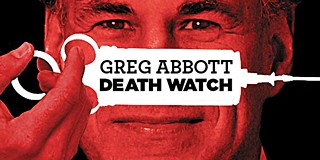Death Watch: No Recourse for Mental Illness
Texas about to execute another insane inmate
By Chase Hoffberger, Fri., March 13, 2015
The effort to save the life of Randall Mays has been equally swift and unsuccessful. Since May of 2007, when he shot and killed Henderson County Deputy Sheriffs Tony Ogburn and Paul Habelt in a standoff on his property, attorneys for the 55-year-old inmate have attempted to argue their client is not mentally fit for execution.
The shootout that landed Mays on death row occurred after police were called to calm him after he fired random gunshots upon learning that his wife, Candis, had been sexually assaulted by three men. Neither he nor Candis took kindly to the sheriffs' presence. The situation escalated, and one sheriff began to read Mays his Miranda rights. Mays darted to his house and barricaded himself inside. A few minutes later, he fired two fatal shots at Ogburn and Habelt. (A third bullet also hit Deputy Sheriff Kevin Harris in the leg.)
Defense attorneys at trial tried to paint Mays as a long-suffering victim of mental disease; a man whose chronic paranoia meant he never responded well to escalating, high-stress situations. He endured a troubled childhood, fell into sustained drug problems, and lost one brother, Kenny, to an overdose. In 1995, he'd lose another – Nobles – when the state executed him for his connection to a 1979 robbery.
Mays was convicted and sentenced to death on May 13, 2008. In April 2010, the Court of Criminal Appeals denied him his direct appeal.
A petition for writ of habeas corpus Mays' attorneys filed in March 2012 touched on a number of perceived failures by his trial counsel – all based on the claim that the original attorneys made little effort to actually show a connection between his actions in May 2007 and his longstanding and severe mental illnesses. Notably, Mays' attorneys never ordered any neuropsychological examinations, and made no effort to procure a jail record indicating that Mays suffered from "organic brain damage." Nor did they ever request a competency hearing.
The writ made clear that executions of individuals with intellectual disabilities are in violation of the Eighth Amendment (barring cruel and unusual punishment), but a response two months later from Texas Department of Criminal Justice Director Rick Thaler noted that a previous ruling from the 5th Circuit Court of Appeals precludes Mays from such relief. A final ruling denying the writ was handed down in Dec. 2013.
Mays' latest attorney, Thomas Smith, has continued filing appeals, filing a writ of certiorari with the U.S. Supreme Court and a lawsuit against the Department of Justice in hopes of getting a Certificate of Appealability from the 5th Circuit. Both have been flatly denied. Mays received his current execution date last January. (It was his second such setting. In 2011, despite the fact that Mays' writ of habeas corpus had not yet been filed, the court temporarily accepted a motion to set an execution date for that Aug. 23.)
Though Mays' case doesn't possess the theatrical details of fellow mentally ill death-row inmate Scott Panetti (who hoped to subpoena Jesus Christ; his execution was stayed in December), his experience with the state of Texas still points to a deeply rooted struggle for recognition of the Eighth Amendment standards with regard to the rights of the mentally ill. Prosecuting attorneys have argued throughout that since Mays understands what he did to earn a place on death row, the state owes him no additional relief.
Mays is currently scheduled to die on March 18. He would be the fifth Texan executed by Greg Abbott in 2015, and the 523rd since the reinstatement of the death penalty in 1976.
Then comes just a brief reprieve in state-conducted killings – April's docket currently includes the executions of four more inmates: Kent Sprouse, Manuel Garza, Richard Vasquez, and Robert Pruett.
Got something to say on the subject? Send a letter to the editor.













